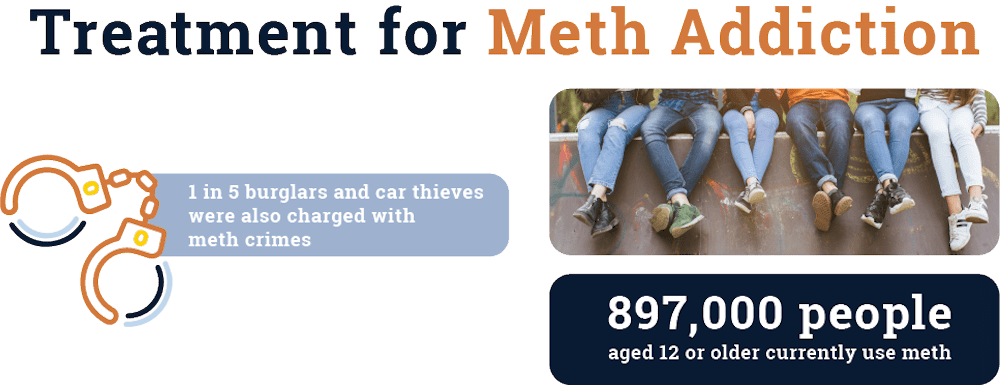Meth Rehab Center in Illinois
Meth is a highly addictive stimulant drug that is hazardous to your health. meth addiction can happen fast and addiction may take place before the user even realizes it. So, if you are currently suffering from meth addiction, it’s time to find a methamphetamine addiction rehab center.
We offer comprehensive meth addiction treatment in Northern Illinois and also for any associated mental health disorders. Our licensed and experienced staff in our substance abuse treatment programs at Northern Illinois Recovery Center can work with you to end the cycle of addiction, improve your wellness, and get you on the right track.
The Addictive Nature of Meth
Of all the illicit drugs out there today, meth is by far one of the most addictive. When you use meth, the drug produces dopamine, which produces a high energy level, concentration, memory, and production – much higher than your average drug. Most users who start to take meth stay on the drug for several weeks or months.
Unlike other drugs where you may come off your high and then revisit it at another time, meth users want to stay perpetually high 24/7. As a result, you may form a dependency on the drug at a faster rate. In addition, the side effects of meth can happen more quickly and be more intense.
Thankfully our stimulant addiction treatment center can help individuals overcome meth abuse. Allow our Illinois treatment facility to guide you through your recovery journey today.

How Does Meth Addiction Develop?
The overall rush of dopamine that is produced by meth is much higher than the natural amount of dopamine that’s produced by the brain. This causes individuals to continue using the drug to keep the heightened and extremely pleasurable feelings. Many of the individuals who engage in meth generally take the drug over numerous days, staying continuously high throughout the duration of time.
Often, the above-mentioned scenario leads to the development of tolerance. After engaging in drug use for an extended period, an individual will require higher doses to feel the same effects as before. The drug’s affordability and stimulant effects can lead individuals to quickly become addicted.
After the above-mentioned occurs, it might become difficult to feel happiness when attempting to stop meth. Withdrawal symptoms such as insomnia, fatigue, depression, and anxiety, can continue to occur until it wears off. After the reward system is dependent on the drug, the fear of cravings and withdrawal from meth are effectively taken over an individual’s life often.
What Are the Effects of Meth Addiction?
- Decreased appetite
- Irregular heartbeat
- Skin sores
- Infection
- Rapid tooth decay
- Elevated blood pressure
- Sexually transmitted diseases
If you snort meth, you may notice deterioration in your sinus cavities or nasal passages. You can tell if you have deterioration when your nose bleeds all of the time. Meth can also have a significantly negative impact on your heart and nervous system.
You may suffer from seizures, heart attack, stroke, or an overdose. Do not let the powerful effects of meth dominate your life. Our drug and alcohol detox center in Northern Illinois is available to help you overcome the negative side effects of meth addiction
Even engaging in small amounts of meth can cause very harmful health effects, including:
- Disturbed sleep patterns, nausea, or loss of appetite
- Body temperature and increased blood pressure
- Aggressive, irritable, violent, and erratic behavior
- Irregular or rapid heartbeat
- Faster breathing
Long-term meth abuse can lead to various, damaging and long-term health effects, even when individuals stop engaging in meth use, such as:
- Hallucinations, mood disturbances, delusions, paranoia, repetitive motor activity, violent behavior (psychotic symptoms can sometimes last for months or even years after meth use)
- High blood pressure leads to strokes and heart attacks
- Intense itching, causing skin sores from scratching
- Permanent damage to the brain and heart
- Changes in brain structure and functioning
- Deficits in motor skills and thinking
- Confusion, insomnia, and anxiety
- Kidney, lung, and liver damage
- Aggressive or violent behavior
- Severe dental problems
- Premature osteoporosis
- Increased distractibility
- Memory loss
- Weight loss
- Addiction
Chronic meth use can lead to extreme mental and physical health complications. So, it is important for meth users to get professional help as quickly as possible. Thankfully, there is hope for those suffering from methamphetamine use disorder. Here at Northern Illinois Recovery Center, we are committed to helping meth addicts become former meth users. Our methamphetamine addiction treatment program can end drug abuse and provide emotional support for those in recovery.
The long-term effects of meth abuse have various consequences, including addiction. Addiction is considered a chronic and relapsing disease that is characterized by compulsive drug-seeking use. It is also accompanied by molecular and functional changes in the brain.
Similar to several other drugs, the tolerance to methamphetamine’s enjoyable effects develops when it is repeatedly taken. To receive the desired effect, individuals who engage in meth need to take higher doses of the drug, take it more regularly, or even change how they take it to gain the desired effect. When individuals engage in chronic methamphetamine use, they might experience challenges feeling any other pleasure other than the one provided by the drug.
Therefore, fueling further abuse in meth abuse individuals. The withdrawal from methamphetamine happens when an individual who chronically abuses stops engaging in drug use. Symptoms of withdrawal include anxiety, fatigue, an intense craving for the drug, and depression.
Additionally, for those who are addicted to methamphetamine, individuals who engage in methamphetamine long-term might start to exhibit symptoms that can include significant confusion, insomnia, mood disturbances, violent behavior, and anxiety. The same individuals might display several psychotic features, including visual and auditory hallucinations, paranoia, and delusions. For example, the sensation of insects creeping underneath the skin.
Psychotic Symptoms of Meth Addiction
The above-mentioned situation accounts for various cognitive and emotional issues observed in the individuals. There has also been research that has indicated that methamphetamine also alters the brain structures that are involved in a person’s decision-making. It also impairs the overall ability to subdue the habitual behaviors that have become ineffective or pointless.
The two effects were correlated suggesting that the overall structural change underlies the decline in a person’s mental flexibility. Ultimately, these brain structure changes can thoroughly explain why meth abuse recovery is so difficult to treat and there’s a significant chance of relapse early in the treatment.
Meth Addiction Rehab in Illinois
Therefore, building more of a positive self-image and solid trust. Furthermore, treatment helps the patient in exploring triggers, warning signs, and motives for substance abuse they might have not been aware of. By fully uncovering the overall root of addiction, patients can better understand the value of receiving treatment in a supportive facility.

Insurance Verification






Meth Rehab at Northern Illinois Recovery
Treatment for substance use disorders may begin with a medically-supervised detox process. Methamphetamine withdrawal symptoms can be incredibly intense and, in some cases, dangerous. But a professional detox program can assist in this area. A treatment specialist can monitor your withdrawal symptoms and progress, enabling you to safely end the use of meth or any other addictive substance.
If you’ve been looking for detox centers in Illinois, NIRC can help you through your early recovery and point you in the right direction. Our detoxification program, followed by our effective treatment options, can set you up for success and help you stay sober and addiction-free.
An inpatient substance abuse rehab program allows individuals to live at a rehab center for the duration of their treatment. This provides around-the-clock access to medical and emotional support. If you are working to overcome a substance use disorder such as meth addiction, a residential program can make all the difference as you pursue freedom from addiction.
Residential rehab for a stimulant use disorder can help prevent relapse during early recovery and provide support during the long process of overcoming substance abuse.
Patients who complete a residential program or detox process can transition into an outpatient program to continue their substance abuse treatment. In an outpatient program, individuals are not required to live at a rehab facility. Instead, they can live at a sober living home or at their own personal residence. If you are seeking outpatient drug treatment services in Illinois, our program might be exactly what you need.
Therapeutic approaches can help people become and remain free from substance use disorders. Addiction therapy and support groups provide relapse prevention techniques, accountability, positive reinforcement, and overall healing from the devastating effects of addiction.
Our addiction counseling services in Illinois include family therapy, group therapy, individual counseling, cognitive behavioral therapy, dialectical behavior therapy, and more. Some addiction treatment centers may also offer contingency management and other types of therapies.
Many people who have substance use problems also have mental health disorders. An individual suffering from meth addiction may also have a co-occurring mental health disorder such as attention deficit hyperactivity disorder (ADHD), anxiety, depression, and so forth. Treating a behavioral health problem such as addiction without addressing the effects of a co-occurring mental illness can be counterintuitive. But, a dual diagnosis program can address both issues effectively.
If you’ve been searching for dual diagnosis treatment centers in Illinois, look no further than Northern Illinois Recovery Center. We strive to provide the very best possible care for those who come to our facility. So, if you need meth addiction treatment in addition to mental health support, we are here for you.



